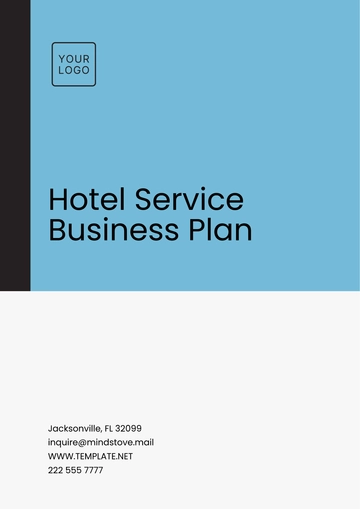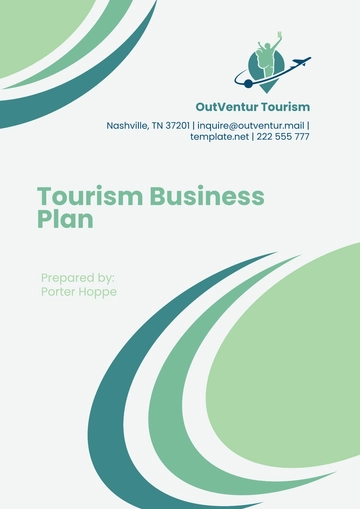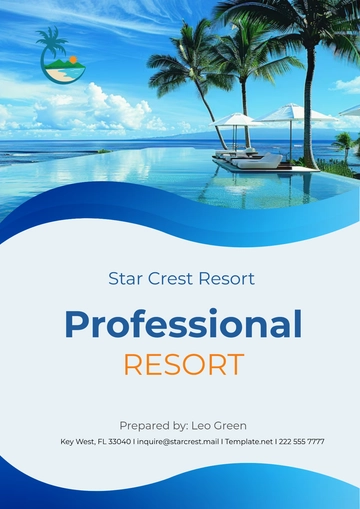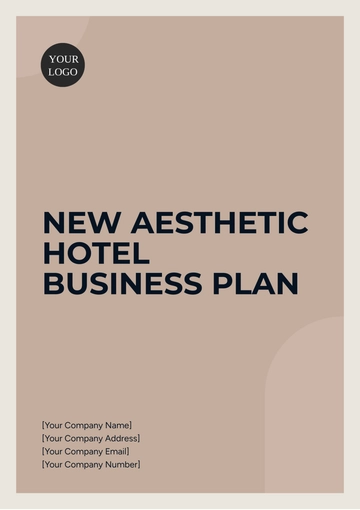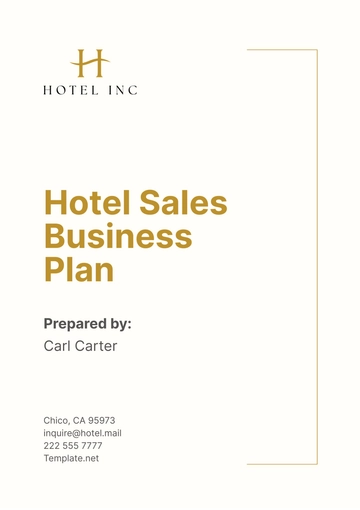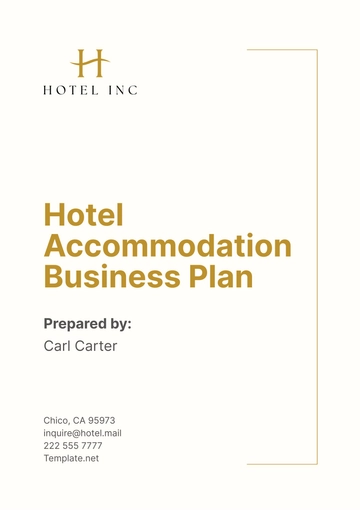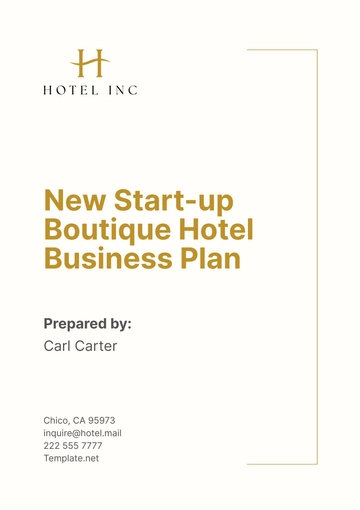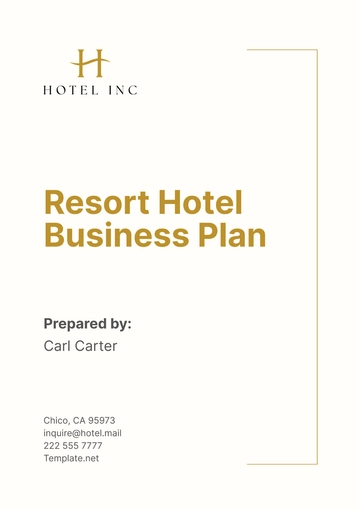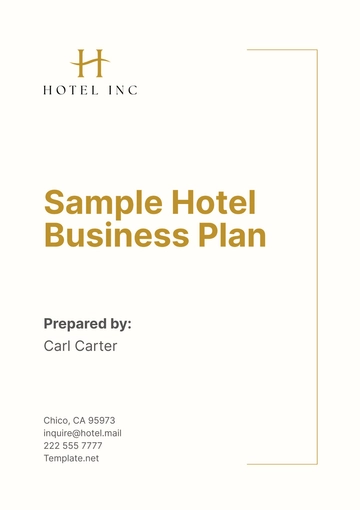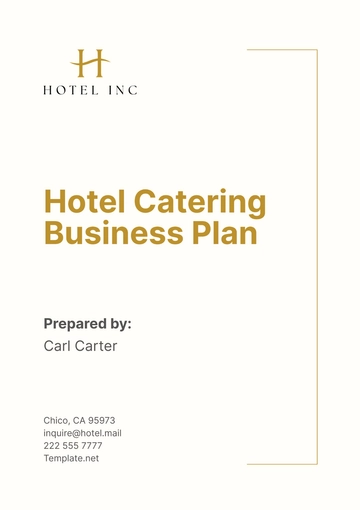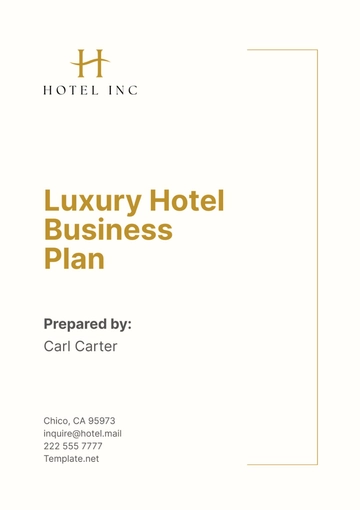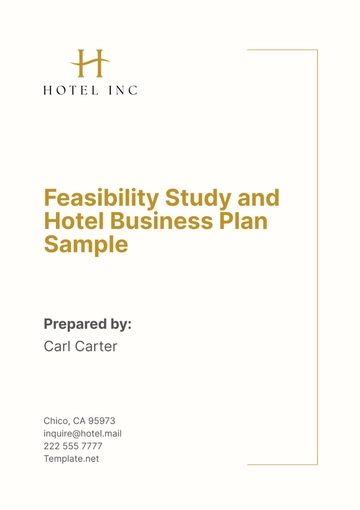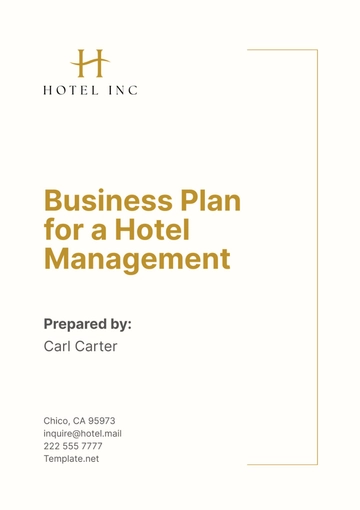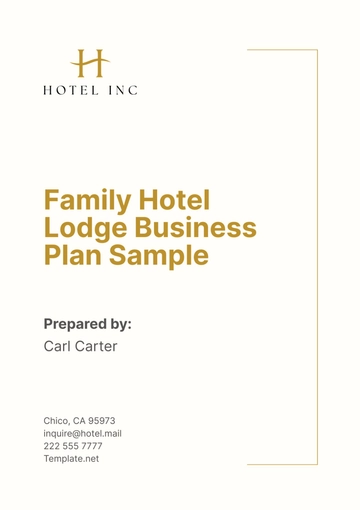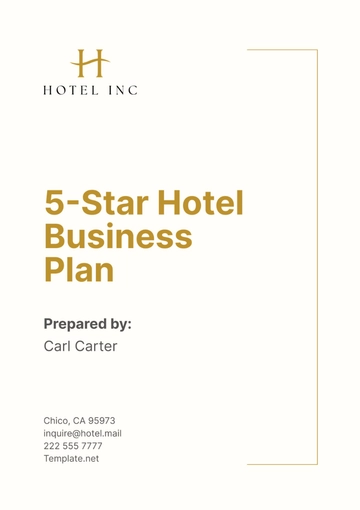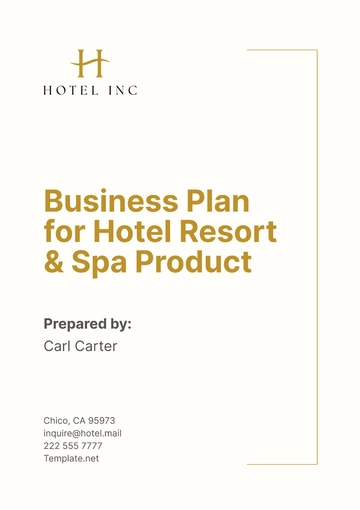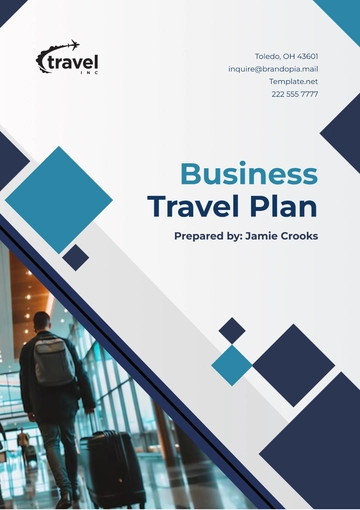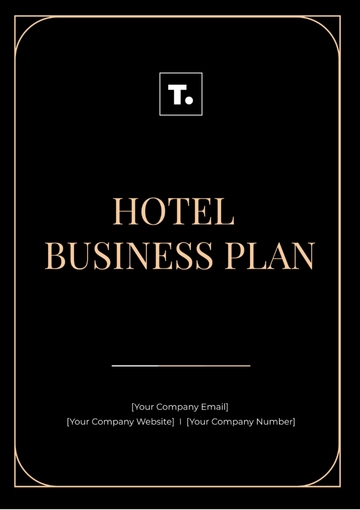Free Feasibility Study and Hotel Business Plan Sample
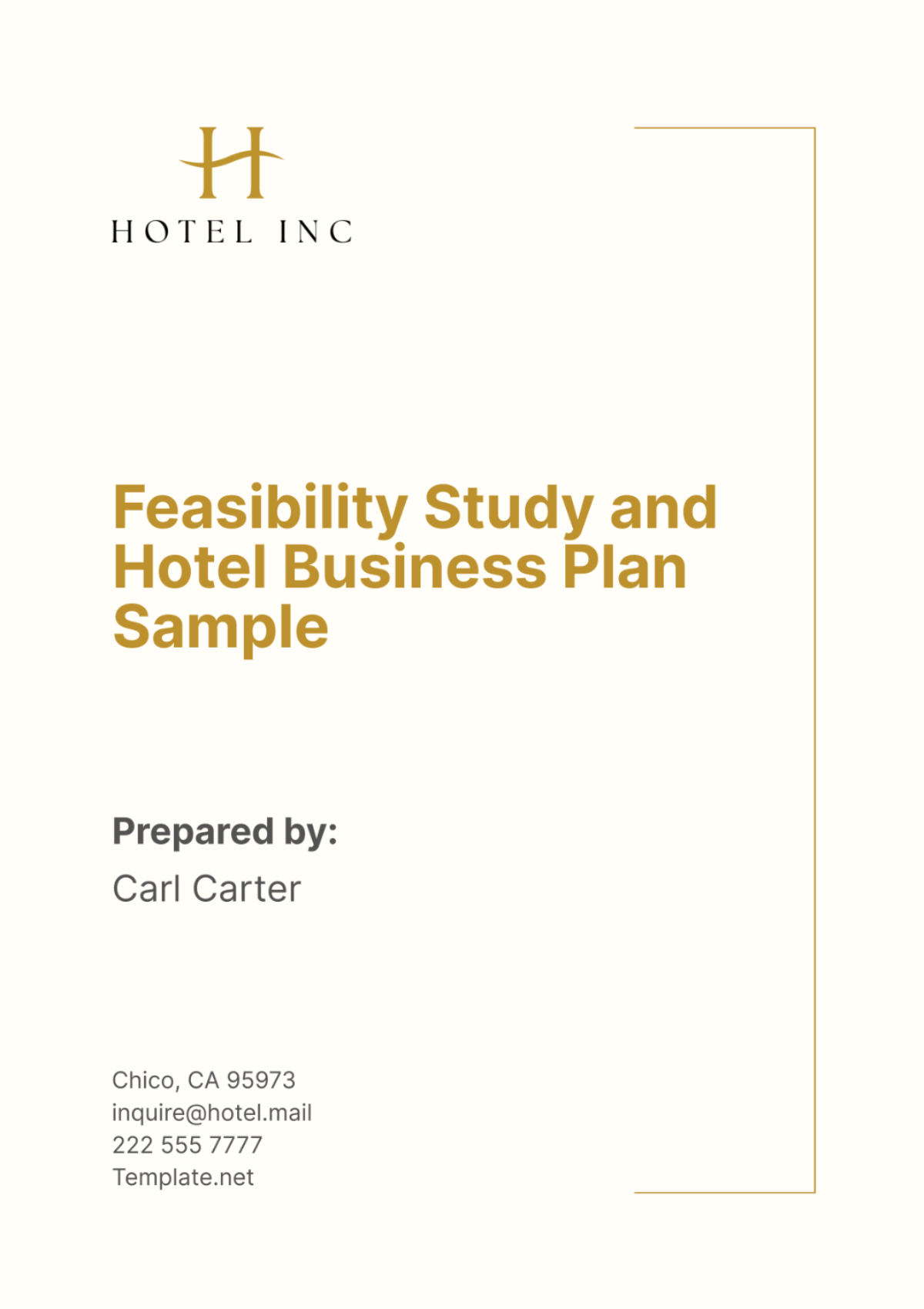
I. Executive Summary
[Your Company Name] is poised to establish a state-of-the-art hotel, blending luxury with exceptional service to cater to the distinct needs of both leisure and business travelers. Our strategic location, paired with cutting-edge amenities, positions us uniquely in the hospitality market. This business plan outlines our approach to capturing key demographics, maximizing operational efficiency, and achieving financial sustainability within the first three years of operation.
Our vision to become the leading destination in hospitality is supported by a meticulously crafted operational framework and an aggressive marketing strategy. We are committed to innovative service delivery and sustainable practices that are expected to set new standards in the industry. The following document details the projected financials, marketing strategies, and operational procedures designed to propel [Your Company Name] to the forefront of the hospitality sector.
With a comprehensive analysis of the market trends and competitive landscape, this plan demonstrates a clear path to profitability and market leadership. [Your Company Name] requires initial funding to realize these ambitions, which we anticipate securing through a combination of investor backing and strategic partnerships. This executive summary encapsulates the strategic direction and financial forecasts that illustrate our preparedness and commitment to excellence in launching this exciting venture.
II. Business Overview
[Your Company Name] aspires to redefine the hospitality landscape by launching a premier hotel designed for both leisure and business travelers. This section delves into our innovative business concept, our ambitious vision and mission, and our strategic objectives that guide our operational and financial planning to ensure the realization of our goals.
A. Business Concept
At [Your Company Name], we are committed to creating a luxurious haven that seamlessly combines comfort with functionality. Our hotel will cater to discerning travelers seeking an unparalleled experience, with state-of-the-art facilities, bespoke services, and a focus on eco-friendly practices. By leveraging innovative technology and personalized guest services, we aim to set a new benchmark in hospitality excellence, ensuring every stay is memorable and every guest feels valued.
Our hotel will feature an array of exceptional facilities including a state-of-the-art wellness center, gourmet dining options, and versatile conference spaces, tailored to the needs of both leisure and business guests. To enhance the guest experience, we will integrate advanced technologies for seamless service delivery such as mobile check-in and personalized room settings. Moreover, we will foster a culture of excellence among staff, emphasizing continuous training and empowerment to exceed guest expectations consistently, making every interaction memorable and setting [Your Company Name] apart in a competitive market.
B. Vision and Mission
Vision: [Your Company Name] strives to be the most sought-after hospitality destination, renowned for its blend of luxury, comfort, and impeccable service. We envision a hotel that not only meets but exceeds the expectations of the modern traveler, setting the standard for luxury and service in the industry.
Mission: Our mission is to deliver unparalleled hospitality experiences that exceed customer expectations. We will achieve this through our commitment to innovative service, superior amenities, and sustainable practices, ensuring every aspect of our operation contributes to a positive and memorable guest experience.
C. Objectives
Below are the detailed primary objectives of [Your Company Name]:
Secure Funding: Obtain the necessary capital to launch our hotel venture, targeting a mix of equity investments and long-term financing to cover initial construction, furnishing, and operational start-up costs.
Achieve Sustainable Profitability: Reach operational profitability within the first three years post-launch by optimizing our revenue management strategies, enhancing operational efficiencies, and maintaining high occupancy rates.
Establish Market Leadership: Position [Your Company Name] as a premier destination in the hospitality industry through strategic branding, exceptional customer service, and continuous innovation in our offerings. We aim to build a strong brand reputation that attracts repeat business and maximizes guest loyalty.
III. Market Analysis
The Market Analysis section of our business plan provides a detailed exploration of the hospitality industry, pinpointing current trends, key demographics, and competitive dynamics. This comprehensive analysis is crucial for positioning [Your Company Name] effectively within the market. It supports our strategic planning by identifying growth opportunities and areas for differentiation from our competitors.
A. Industry Overview
The hospitality industry is witnessing a rapid evolution driven by changing consumer preferences and technological advancements. Our analysis focuses on the resurgence of travel post-pandemic, with an expected annual growth rate of 5.8% over the next decade. Key trends include a rising demand for boutique and luxury accommodations, increased focus on health and wellness, and the integration of smart technology in hotel operations.
Trend | Impact on Industry | Projected Growth |
|---|---|---|
Boutique Hotels | High demand for personalized experiences | 7% annually |
Health and Wellness Features | Growing guest preference for wellness options | 6.5% annually |
Smart Technology Integration | Enhanced operational efficiency and guest satisfaction | 8% annually |
B. Target Market
Our primary target market includes affluent leisure travelers aged 30-55, who value luxury and personalized experiences. Secondary targets are business travelers who require connectivity and convenience. Both segments show a preference for sustainable and technologically integrated lodging options.
Segment | Demographics | Preferences | Market Size Growth |
|---|---|---|---|
Affluent Leisure Travelers | Ages 30-55, high income | Luxury, personalization, sustainability | 4% annually |
Business Travelers | Professional, frequent travelers | Efficiency, connectivity | 3.5% annually |
C. Competitive Analysis
Our competitive analysis reveals that our main competitors are established luxury hotels and upcoming boutique establishments. We have evaluated their strengths, such as brand reputation and loyalty programs, against their weaknesses, like lack of customization and aging infrastructure.
Competitor | Strengths | Weaknesses | Market Share |
|---|---|---|---|
[Competitor Name A] | Strong brand, extensive loyalty program | Aging facilities | 20% |
[Competitor Name B] | Unique thematic experiences, modern facilities | Limited scalability | 15% |
By understanding these market dynamics, we can strategize effectively to capitalize on unmet needs and differentiate [Your Company Name] from its competitors, ensuring a strong market entry and sustained growth.
IV. Marketing Strategy
Our Marketing Strategy section details a cohesive approach to building the [Your Company Name] brand and enhancing its market position. By leveraging a combination of innovative branding, diverse marketing channels, and dynamic promotional activities, we aim to attract and retain our target audience effectively. This section underscores our commitment to positioning [Your Company Name] as a top choice for luxury and customer-centric hospitality experiences.
A. Branding and Positioning
Our branding strategy focuses on positioning [Your Company Name] as the epitome of luxury and personalized service. By emphasizing these core values, we aim to attract discerning guests who seek exceptional experiences.
Strategy | Objective | Approach |
|---|---|---|
Luxury Branding | To establish a reputation for opulence and high-end services | High-quality materials, exclusive services |
Personalized Experiences | To differentiate by offering customizable guest experiences | Use of AI and data analytics to tailor services |
Sustainability | To appeal to environmentally conscious consumers | Eco-friendly practices and sustainable materials |
B. Marketing Channels
To ensure broad and effective reach, our marketing utilizes a blend of online and offline channels, optimized to target our specific audience segments efficiently.
Channel | Purpose | Techniques |
|---|---|---|
Online - SEO, SEM | To increase visibility and organic reach on search engines | Keyword optimization, ad placements |
Social Media | To engage with guests and build community | Targeted ads, interactive content, influencer partnerships |
OTAs | To capture bookings from global travelers | Optimized listings, strategic pricing |
Offline - Print Advertising | To reach traditional markets with high visibility | Magazines, newspapers, premium placements |
Travel Fairs | To connect directly with potential clients | Booths, presentations, direct bookings |
Partnerships | To leverage networks for broader reach | Collaboration with travel agencies and corporate partners |
C. Promotional Activities
Our promotional strategies are designed to boost bookings during key periods and foster customer loyalty through exclusive offers and incentives.
Activity | Goal | Details |
|---|---|---|
Special Offers | To attract new guests during launch and low seasons | Discounts, welcome packages |
Packages | To increase bookings for extended stays and special occasions | Bundled accommodations and services |
Loyalty Programs | To encourage repeat bookings and referrals | Points system, perks for frequent guests |
Seasonal Promotions | To capitalize on peak travel seasons | Themed packages, events, and discounts |
This structured marketing approach is tailored to project [Your Company Name] as a leader in the hospitality industry, ensuring we not only meet but exceed the expectations of our guests.
V. Operational Plan
Our Operational Plan outlines the strategic approach to managing the physical, human, and procedural aspects of [Your Company Name]. This section ensures that all operations align with our high standards of service and efficiency, supporting our overall business objectives. We detail the crucial elements of our location, facilities, staffing, and daily operational processes to demonstrate a comprehensive and effective operational strategy.
A. Location and Facilities
[Your Company Name] will be strategically located in a thriving metropolitan area, accessible to both business districts and tourist attractions. Our facilities will reflect our luxury branding and focus on guest comfort and experience.
Feature | Description | Benefits |
|---|---|---|
Location | Central, accessible area near attractions and business hubs | Convenience, attractiveness to both business and leisure travelers |
Guest Rooms | Luxurious, equipped with modern technology and amenities | Comfort, personalization, enhanced guest experience |
Wellness Center | State-of-the-art gym, spa, and indoor pool | Health and relaxation, added value for guests |
Conference Facilities | Modern conference rooms with high-tech equipment | Business guest accommodation, event hosting capabilities |
Dining Options | Multiple on-site restaurants offering diverse cuisines | Convenience, luxury dining experience for guests |
B. Staffing Requirements
Effective staffing is critical to maintaining the high service standards of our hotel. We will employ a combination of seasoned hospitality professionals and fresh talent to create a dynamic team.
Role | Responsibilities | Qualifications |
|---|---|---|
General Manager | Overall hotel management and operations oversight | Extensive experience in hotel management, leadership skills |
Front Office Manager | Management of guest services and reception | Hospitality management, excellent interpersonal skills |
Housekeeping Manager | Oversee all housekeeping operations | Experience in housekeeping, organizational skills |
Chef | Lead culinary team, menu development | Culinary arts degree, experience in fine dining |
Marketing Manager | Develop and implement marketing strategies | Marketing degree, experience in hospitality marketing |
C. Operational Processes
Our daily operations will be governed by structured processes designed to maximize efficiency and ensure the highest quality of service delivery.
Process | Description | Implementation Method |
|---|---|---|
Check-In/Out Procedures | Efficient guest check-in and check-out | Digital systems for speed, staff training for personal touch |
Housekeeping Routines | Daily room and public area cleaning | Scheduled cleanings, quality checks |
Guest Services | 24/7 availability to meet guest needs | Staff shifts, guest service training |
Maintenance | Regular maintenance of facilities | Preventative maintenance schedule, quick repair policies |
Emergency Procedures | Handling emergencies with minimal disruption | Regular staff training, clear guidelines |
This operational plan forms the backbone of our hotel's functionality, ensuring every aspect of the guest experience is meticulously planned and executed.
VI. Financial Plan
The Financial Plan for [Your Company Name] is meticulously structured to ensure clarity in our financial objectives and requirements. This section breaks down the start-up costs, projects the revenue over the first three years, and details the funding requirements necessary to achieve our strategic objectives. The financial blueprint is designed to provide potential investors with a clear, detailed perspective of our expected financial performance and capital needs.
A. Start-up Costs
Our start-up costs outline the initial capital investment needed to launch [Your Company Name], ensuring our facilities and services meet the highest standards of luxury and functionality.
Item | Description | Cost (USD) |
|---|---|---|
Real Estate Acquisition | Purchase of property in a prime location | $10,000,000 |
Construction and Renovations | Building and customizing hotel facilities | $8,000,000 |
Furnishing and Equipment | High-end furnishings and state-of-the-art equipment | $2,000,000 |
Licensing and Permits | Legal fees and governmental approvals | $500,000 |
Initial Marketing and Branding | Pre-launch advertising and promotional activities | $1,000,000 |
Total Start-Up Costs | $21,500,000 |
B. Revenue Projections
This table projects the revenue, expenses, and profit for the first three years of operation, highlighting our growth strategy and financial planning.
Year | Revenue | Expenses | Profit |
|---|---|---|---|
Year 1 | $5,000,000 | $6,000,000 | -$1,000,000 |
Year 2 | $8,000,000 | $5,500,000 | $2,500,000 |
Year 3 | $12,000,000 | $6,000,000 | $6,000,000 |
C. Funding Requirements
Our funding requirements detail the capital needed to launch and sustain the hotel during its initial years, outlining potential sources and planned utilization of these funds.
Requirement | Amount (USD) | Source | Utilization |
|---|---|---|---|
Initial Capital | $21,500,000 | Equity Investors, Bank Loans | Cover start-up costs |
Operational Reserve | $3,000,000 | Bank Loans, Additional Investor Funding | Support operations in Year 1 |
Total Funding Needed | $24,500,000 |
This financial plan serves as a robust framework to ensure [Your Company Name] effectively manages its financial resources, secures necessary funding, and achieves its profitability and growth targets.
VII. Risk Analysis
The Risk Analysis section of our business plan for [Your Company Name] critically assesses potential risks that could impact our operations, financial stability, and market position. This analysis allows us to prepare and implement effective mitigation strategies, ensuring the resilience and sustainability of our business. Below, we identify key risks and outline corresponding strategies to manage and mitigate these challenges effectively.
A. Risk Factors
This table outlines seven significant risks that could potentially affect our hotel operation, ranging from market dynamics to operational challenges.
Risk Type | Risk Factor | Potential Impact |
|---|---|---|
Market Risk | Economic Downturn | Reduced guest spending and travel |
Financial Risk | Overleveraging | Inability to meet financial obligations |
Operational Risk | Supply Chain Disruptions | Delays in service and increased costs |
Competitive Risk | New Competitors in the Market | Loss of market share |
Technological Risk | Cybersecurity Threats | Data breaches, loss of trust |
Regulatory Risk | Changes in Hospitality Laws | Increased operational costs, penalties |
Environmental Risk | Natural Disasters | Damage to property, disruption of service |
B. Mitigation Strategies
For each identified risk, we have developed strategies to mitigate the impact, ensuring that our operations remain stable and growth-oriented.
Risk Factor | Mitigation Strategy | Implementation Details |
|---|---|---|
Economic Downturn | Diversification of Revenue Streams | Develop alternative revenue channels such as events, conferences, and wellness retreats. |
Overleveraging | Prudent Financial Management | Maintain a balanced debt-to-equity ratio; establish a reserve fund. |
Supply Chain Disruptions | Establish Multiple Supplier Relationships | Contract with multiple suppliers to ensure redundancy in key service and product lines. |
New Competitors in the Market | Strong Branding and Customer Loyalty Programs | Implement loyalty programs and continuously innovate service offerings. |
Cybersecurity Threats | Enhanced IT Security Protocols | Regular audits, staff training in data security, investment in up-to-date security technologies. |
Changes in Hospitality Laws | Continuous Regulatory Monitoring | Stay updated with industry regulations, engage legal experts for compliance strategies. |
Natural Disasters | Comprehensive Disaster Recovery Plan | Invest in insurance, develop and regularly update emergency response plans. |
This Risk Analysis provides [Your Company Name] with a roadmap to navigate potential challenges. By anticipating and preparing for these risks, we enhance our ability to operate efficiently and maintain our commitment to providing exceptional hospitality experiences.
VIII. Appendices
The Appendices section of our business plan for [Your Company Name] serves as a repository for critical documents that substantiate the contents of our strategic proposal. By including comprehensive supporting materials and detailed management resumes, we provide concrete evidence of our preparedness, professionalism, and the depth of our market and operational insights.
A. Supporting Documents
This subsection includes vital documents that underpin the feasibility and strategic planning of our hotel venture. By providing access to detailed market research, meticulously developed architectural plans, and robust legal agreements, we ensure that stakeholders can review the foundational elements that support our business strategy.
Market Research Data: Comprehensive analysis of current trends, customer demographics, and competitive benchmarks in the hospitality industry.
Architectural Plans: Detailed drawings and specifications showcasing the design and layout of the hotel, including guest rooms, public areas, and back-of-house facilities.
Legal Agreements: Contracts and agreements with vendors, partners, and government bodies, including construction contracts, supply agreements, and regulatory compliance documents.
Financial Projections: Detailed spreadsheets and financial models forecasting revenue, expenses, and profitability over the first five years.
Environmental Impact Assessments: Studies and reports evaluating the environmental effects of the hotel's construction and operation, along with mitigation strategies.
Marketing Strategy Documentation: Plans and materials related to branding, promotional campaigns, and marketing channel strategies.
Operational Protocols: Manuals and procedures for daily operations, staff training, and emergency response.
B. Management Resumes
Here, we showcase the resumes of our key management personnel, highlighting their extensive expertise and proven industry experience. Each resume details the individual's background, key achievements, and specific skills that contribute to their capability to lead and innovate within the hospitality industry. See the attached resumes in this document.
General Manager: Detailed career history focusing on previous leadership roles in hospitality management, with highlights on successful hotel launches and operations.
Financial Director: Background in finance within the hospitality sector, including expertise in capital budgeting, financial analysis, and investor relations.
Human Resources Manager: Experience in talent acquisition, staff development, and employee relations within dynamic service environments.
Marketing Director: Proven track record in crafting and executing marketing campaigns that increase customer engagement and drive revenue.
Operations Manager: Detailed experience in managing hotel operations, with a focus on efficiency improvements and high-quality guest service.
Executive Chef: Culinary background with experience in menu development and kitchen management at high-end establishments.
IT Director: Expertise in implementing technology solutions that enhance guest experiences and operational efficiency.
These lists are designed to provide a comprehensive overview of the documentation and professional expertise that supports the business plan and operations of [Your Company Name].
- 100% Customizable, free editor
- Access 1 Million+ Templates, photo’s & graphics
- Download or share as a template
- Click and replace photos, graphics, text, backgrounds
- Resize, crop, AI write & more
- Access advanced editor
Discover the perfect Feasibility Study and Hotel Business Plan Sample Template at Template.net. This fully customizable and editable template serves marketing professionals in crafting meticulous, data-driven plans. Editable in our AI Editor Tool, it provides swift modifications to tailor the document to your specific needs. Equip yourself with confidence, precision, and efficiency, propelling your hotel venture towards success.
You may also like
- One Page Business Plan
- Coffee Shop Business Plan
- Restaurant Business Plan
- Food Business Plan
- Real Estate Business Plan
- Executive Summary Business Plan
- Cover Page Business Plan
- Nonprofit Business Plan
- Daycare Business Plan
- Construction Business Plan
- Startup Business Plan
- Medical Business Plan
- Bakery Business Plan
- Service Plan
- Hotel Business Plan
- Catering Business Plan
- School Business Plan
- Healthcare Business Plan
- Transportation Plan
- Sports Plan
- Car Wash Business Plan
- Salon Business Plan
- Clothing Business Plan
- Farming Business Plan
- Boutique Plan
